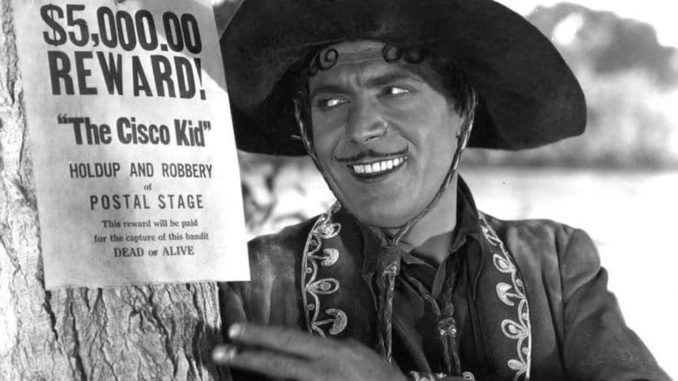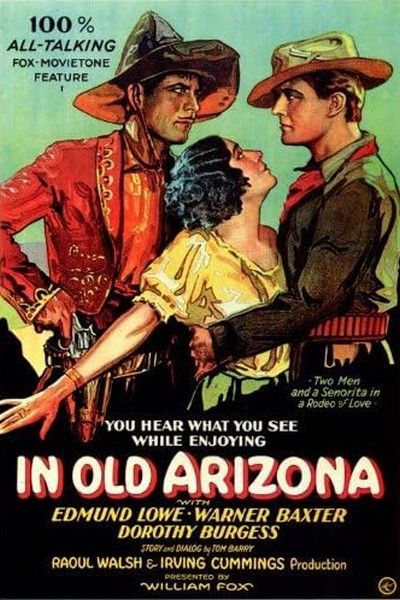
Rating: C+
Dir: Irving Cummings, Raoul Walsh
Star: Warner Baxter, Edmund Lowe, Dorothy Burgess, Soledad Jiménez
Though there’s no evidence the makers so much as visited Arizona – Utah largely played the part – it deserves a place for potentially being the first all-sound film set in the state. It had its premiere less than six months after the initial all-talking feature, Lights of New York. Arizona was also the first such talkie to be shot on location, rather than a studio. It proved a commercial and critical success, being nominated for five Oscars (quite a feat, at a time when there were only seven Academy Award categories), with Baxter winning Best Actor. But contemporary critical opinion now views it less kindly – it’s only 2.7 out of five on Letterboxd – and it has largely been forgotten.
This is understandable. When new technology arrives, it tends initially to be used by technicians, and it’s a while before artists take over. Here, it is safe to say the miracle of characters talking, on which the movie leans heavily, is no longer as impressive as it would have seemed at the time. But I feel this does still have its moments. The story is about the battle between an outlaw, the Cisco Kid (Baxter), and the lawman who seeks to bring him to justice, Sergeant Mickey Dunn (Lowe). Complicating matters is the woman who has a foot in both camps, Tonia Maria (Burgess). She is initially with Cisco, but the prospect of the five thousand dollar bounty causes her to switch allegiance to Dunn. The Kid is not happy when he finds out.
 From a modern perspective, the most glaring problem is Baxter in brownface, adopting an outrageous Hispanic accent. It’s odd, because in the story on which this was based, The Caballero’s Way by O. Henry, there’s no indication the Cisco Kid is other than white. Here, Cisco says he ran away from Portugal when he was fifteen, doubling down on the unnecessary change. Burgess is no more authentic, and Lowe doesn’t make much of an impression either. However, it’s fun to watch a film from the brief period after sound, before censorship arrived in the form of the Hays Code. When Mickey first meets Tonia, he’s unimpressed:
From a modern perspective, the most glaring problem is Baxter in brownface, adopting an outrageous Hispanic accent. It’s odd, because in the story on which this was based, The Caballero’s Way by O. Henry, there’s no indication the Cisco Kid is other than white. Here, Cisco says he ran away from Portugal when he was fifteen, doubling down on the unnecessary change. Burgess is no more authentic, and Lowe doesn’t make much of an impression either. However, it’s fun to watch a film from the brief period after sound, before censorship arrived in the form of the Hays Code. When Mickey first meets Tonia, he’s unimpressed:
You can’t understand any man not falling in love with you, huh?
Well, what’s the matter with me?
Turn around, let’s see.
I genuinely laughed at that risque comeback.
It also almost becomes poignant when Cisco talks to Tonia, knowing she has betrayed him. “I am sure that this life I live, it does not pay. But like the man who is caught in the whirlpool, I cannot get out.” The ending is surprisingly downbeat too: again, predating the Hays Code requirement that criminals must be seen to pay for their crimes. There’s no denying it is very talky. But complaining about that, is like criticizing Avatar for making use of 3-D. Though I do wonder if Cameron’s film might end up being similarly downgraded in critical reception, when ninety or so more years have passed.
